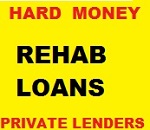 Hard money loans are not for everyone. They are the province of a chosen few – lenders, as well as borrowers. Just the word ‘quick’ eliminates traditional lenders who subscribe to the longer the better philosophy, preferring to finance a loan for the long-term since interest payments are their bread and butter. Once a loan is paid off, their stream of revenue ceases.
Hard money loans are not for everyone. They are the province of a chosen few – lenders, as well as borrowers. Just the word ‘quick’ eliminates traditional lenders who subscribe to the longer the better philosophy, preferring to finance a loan for the long-term since interest payments are their bread and butter. Once a loan is paid off, their stream of revenue ceases.
Hard Money Lenders
Hard money loans are the vehicles of individuals or investment groups who prefer to use their funds to invest in short-term opportunities. They specialize in projects that:
- have equity
- need money as soon as possible
- do not qualify for traditional loans
Rather than looking into the “credit-ability” of the borrower, hard money lenders look to the value of the assets put up as collateral. In a capsule, hard money lenders provide cash payment in less time, with less paperwork than traditional sources of funding, providing the loan is backed by hard assets such as real estate. In exchange they require borrowers to pay higher interest rates and/or points to compensate them for the risk involved.
Hard Money Borrowers
People taking out quick hard money loans run the gamut from borrowers with less than stellar credit histories, to home-buyers caught in the gap between buying a new home and selling their existing ones (bridge loans), to fix and flip investors who profit from buying below-market price homes, adding improvements to them, and selling them as soon as possible. The commonality in all transactions is that the loan is based on the value of the properties, not the credit scores of the borrowers.
Since fix and flip investors typically buy property with cash, and sell it in the space of a year, they like to do business with quick hard money lenders, who, in turn, court them for the relative low risk involved.
Quick Hard Money Loan Structure Explained
 In contrast to a purchase money, or mortgage loan, the amount lent can be based on the value of the house after repairs have been made or the pre-sale appraisal. The amount lent and resulting payments depend on the down payment and the sale value of the improved property, or in other words the loan-to-value (LTV) ratio.
In contrast to a purchase money, or mortgage loan, the amount lent can be based on the value of the house after repairs have been made or the pre-sale appraisal. The amount lent and resulting payments depend on the down payment and the sale value of the improved property, or in other words the loan-to-value (LTV) ratio.
A typical fix and flip one-year 70% LTV loan might, depending on the particular case, incur $1,000 in fees, 2- 4 points, and interest payments of 9-12%. The fees including points typically involve appraisal and other preliminaries and so are paid up front, while monthly interest-only payments are spread over the life of the loan, and a lump sum or balloon payment must be paid at the end of the loan's term, or the sale of the property, whichever comes first. By their very nature, quick hard money loans usually do not incur pre-payment penalties.
The above loan structure represents only one example. If you have a fix and flip property in mind, or feel you qualify for a hard money loan for any other reason, research hard money lenders to find a loan to fit your situation.




We love your feedback and welcome your comments.
Please post below: